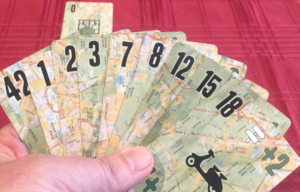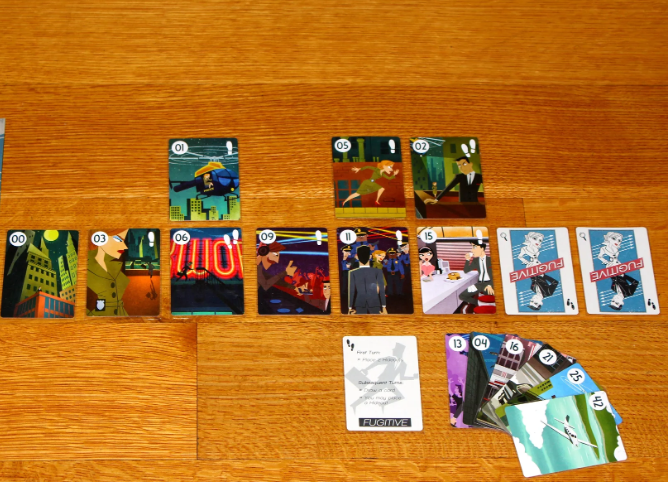The Fugitive Card Game is more than a deck of cards and a chase; it’s an intellectual endeavor that flexes cognitive muscles. This article delves into how this captivating card game serves as a catalyst for enhancing critical thinking, fostering strategic skills, and providing an exhilarating gaming experience.

Understanding the Fugitive Card Game
The Fugitive Card Game elevates card gaming to a whole new level, offering a captivating and strategic experience that surpasses conventional card games. It draws players into an enthralling chase where bluffing and tactical maneuvers become pivotal strategies, all orchestrated within the confines of a deck of cards. As participants step into the roles of either the cunning fugitive or the relentless marshal, they enter a battlefield of wits and witlessness.
The essence of the game lies in outwitting opponents, making strategic decisions, and adapting to the ever-changing dynamics of the chase. As the fugitive attempts to elude capture and the marshal strategizes to close in on the fugitive, every move counts. The fugitive must cleverly bluff and evade capture, while the marshal must decipher the fugitive’s moves and anticipate their next steps.
Analyzing Moves and Countermoves
The Fugitive Card Game is a realm where strategic thinking reigns supreme. Each move made in this intense chase requires a meticulous analysis of the current situation and an anticipation of possible countermoves from opponents. This constant analysis is what sharpens critical thinking abilities, providing an engaging environment where players aren’t merely reacting but proactively planning and strategizing.
The crux of the game lies in predicting and countering the opponent’s moves, much like a chess game. Players need to assess the implications of their actions on the ongoing chase and predict how their opponent might react. This process involves evaluating various possibilities, weighing potential outcomes, and strategically deciding the best course of action.
Moreover, the game introduces an intriguing balance of risk and caution. Players need to assess when to take risks to gain an advantage and when to play it safe to avoid potential traps. This delicate balancing act encourages players to consider their moves not just in the immediate context but in the broader scope of the game.
Adaptability and Flexibility
In the Fugitive Card Game, adaptability and flexibility are not just virtues but are deeply ingrained in the game’s essence. This thrilling chase is a dynamic and unpredictable expedition, demanding players to be swift in adjusting their strategies as the game unfolds, highlighting the critical importance of being adaptable in the face of evolving circumstances.
The dynamic nature of the game is driven by multiple factors. Firstly, the roles of fugitive and marshal inherently bring distinct dynamics. As a fugitive, one needs to be agile, proactive, and quick-thinking, whereas as a marshal, a more calculated and strategic approach is necessary. This dichotomy creates a dynamic interplay that necessitates real-time adjustments in strategy.
Moreover, the uncertainty and unpredictability within the game contribute to its dynamic essence. With limited information about the opponent’s hand and potential moves, players need to be ready for unexpected developments. A card draw can significantly alter the course of the game, prompting players to instantly adapt their strategies.
Decoding Challenges
The Fugitive Card Game intricately weaves challenges into its gameplay, mirroring the obstacles encountered in the real world. These challenges are not mere hurdles; they are akin to real-world problems that players must decode rapidly, employing strategic thinking and innovation to navigate through the complexities presented within the confines of the game’s rules. This dynamic engages players in real-time problem-solving, fostering essential skills that extend beyond the gaming realm.
Each challenge in the game is a microcosm of real-world problem-solving. When faced with an obstacle, players must evaluate the situation, consider their options, and strategize to overcome it. This process is not static; it evolves as the game progresses, simulating the dynamic nature of problem-solving in real-life scenarios.
Moreover, the challenges vary in intensity and complexity, mimicking the diversity of problems encountered in reality. Some may require a swift and straightforward solution, while others demand a more intricate and calculated approach. This variety prepares players for the multifaceted nature of challenges they may face in their lives.
Conclusion
The Fugitive Card Game stands as a testament to the fusion of entertainment and cognitive development. It not only challenges your intellect but elevates your cognitive skills to new heights. This exceptional card game is a perfect blend of thrill, strategy, and intellectual stimulation, creating a must-play experience for both casual gamers and those striving to enhance their critical thinking abilities.
The game’s ability to engage players in a dynamic duel, where each move is a strategic decision, underscores its position as a cognitive playground. As players step into the roles of fugitive and marshal, they are immersed in an adrenaline-pumping chase, compelling them to think critically, strategize, and make decisions that significantly impact the game’s outcome.







